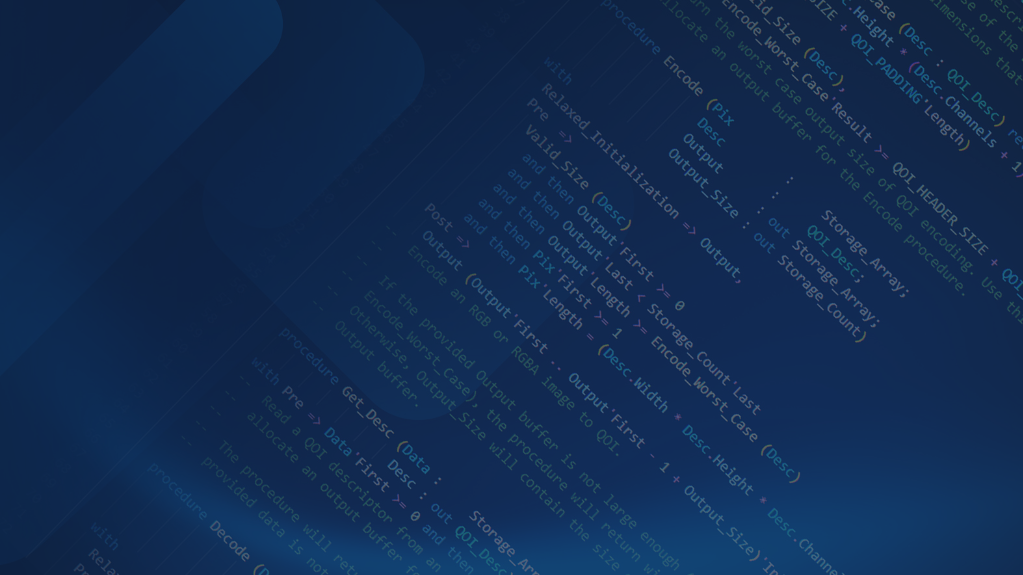
AdaCore + Security
Software complexity continues to grow exponentially while cyber threats evolve at an unprecedented pace. From critical infrastructure to consumer devices, software vulnerabilities can lead to national security breaches, massive financial losses, device hijacking, and privacy violations. Organizations need a comprehensive approach to cybersecurity that goes beyond reactive patching to proactive, built-in security.
Where Our Technology Makes a Difference
Critical Infrastructure Protection
Power grids, water systems, transportation networks, and telecommunications infrastructure require the highest levels of cybersecurity assurance. These systems must operate continuously while defending against nation-state attackers and sophisticated threats. AdaCore's formal verification capabilities and memory-safe languages provide the mathematical certainty needed to protect critical national assets.
Financial Services & Fintech
Financial systems handle sensitive data and high-value transactions that make them prime targets for cybercriminals. Memory corruption vulnerabilities and logic flaws can lead to massive financial losses and regulatory penalties. Our static analysis tools identify vulnerabilities in existing systems while memory-safe languages prevent future attack vectors, ensuring both security and regulatory compliance.
Medical Device Security
Connected medical devices must balance patient safety with cybersecurity, as vulnerabilities can literally be life-threatening. FDA and international regulations increasingly require security evidence and vulnerability management. AdaCore's formal verification enables mathematical proof of security properties while maintaining the real-time performance critical for medical applications.
Automotive & Transportation Security
Modern vehicles are complex computer networks that must resist both safety-critical failures and cybersecurity attacks. As autonomous systems become prevalent, the consequences of successful attacks grow exponentially. Memory-safe languages and formal verification provide the assurance needed for both functional safety and cybersecurity in next-generation transportation systems.
Defense & Aerospace Security
Military and aerospace systems face the most sophisticated adversaries while operating in environments where failure is not an option. These systems require security measures that remain effective for decades of operation. AdaCore's track record in high-assurance systems and formal verification capabilities provide the foundation for defense against advanced persistent threats.
IoT & Embedded Systems Security
Internet-connected devices often lack traditional security infrastructure while operating in hostile environments. Resource constraints make comprehensive security challenging, yet these devices often control critical functions or handle sensitive data. Memory-safe languages and efficient static analysis enable security-by-design even in resource-constrained environments.
Objective: Zero Defects
Software Complexity
Exponential complexity growth as systems become more interconnected and feature-rich, expanding the attack surface dramatically.
Industry Compliance
Compliance complexity with evolving cybersecurity frameworks, standards, and regulations that demand verifiable security evidence.
Sophisticated Attack Vectors
Sophisticated attack vectors targeting memory safety vulnerabilities, supply chain weaknesses, and architectural flaws that traditional security measures struggle to address.
Reactive Cost Burden
Cost of reactive security through expensive post-deployment patches, emergency response teams, and damage control that far exceeds proactive investment.

All-in-One Software Developer Toolkit
AdaCore provides compilation, verification, and certification-ready tools for Ada, C/C++, and Rust, supporting platforms from bare-metal embedded systems to full server environments. Integrated testing and analysis, combined with compliance with industry standards, ensure robust, mission-critical software development.
Development
Ada, C/C++ and Rust
Support is provided for a wide set of languages relevant to embedded and safety-critical software development:
- Ada 83, 95, 2005, 2012 and 2022
- C89 to C20 and C++98 to C++20
- Rust starting with 1.77.2
DevOps
All tools provided for developers are DevOps ready and can be integrated in off-the shelf or custom pipelines.
Customizable Run-Times
Language run-times can be customized to limit the number of code they contain, from full capability to minimized resource footprint and certification costs, allowing them to be used on large server system as well as resource constrained environments.
LLVM and GCC
AdaCore toolchain are industrial-grade version of the GCC and LLVM compilers, allowing ease of integration in widespread and known environments and pipelines.
Verification
Static Analysis for Ada
Static Analysis technologies is provided for all version of Ada. It covers area such as:
- Code issue scanning
- Cybersecurity weaknesses detection
- Bug identification
- Metric computation
Static Analysis for C/C++
Static Analysis technologies is provided for C/C++. It covers area such as:
- Code issue scanning
- Cybersecurity weaknesses detection
- Bug identification
- Coding standard compliance, including MISRA-C and MISRA-C++
- Metric computation
Dynamic Analysis Suite
Dynamic Analysis covers Ada, C/C++ and Rust, addressing various areas:
- Unit Testing
- Structural Code Coverage up to MC/DC
- Code Fuzzing
Compliance
Vulnerability Monitoring
AdaCore tools are provided with long term support and vulnerability monitoring, able to provide insights on potential issues, impact analysis, mitigation technique and fixes years after initial delivery.
Software Bill of Material
AdaCore produces Software Bills of Materials (SBOMs) for all AdaCore products supplied in the industry-standard SPDX format, allowing automated incorporation into customers’ vulnerability management and reporting systems.

Elevate Safety with MISRA C/C++, Rust, and SPARK
SPARK, Rust, and MISRA C/C++ offer a gradient of possibilities for approaching safety. These are not just about different languages; they are about shifting developers' mindsets and processes when pursuing the highest level of reliability.
A formally verifiable subset of Ada that enables mathematical proof of correctness. Eliminates entire classes of errors, providing the highest level of assurance for critical software.
A modern systems language with ownership and borrowing to enforce memory safety. Reduces runtime risks, though concurrency and “unsafe” code require careful handling.
Widely used industry guidelines that mitigate many of C/C++’s inherent risks. Helps structure development, but safety depends on process discipline.
Powering Cloud and Edge Platforms
We support over one hundred off-the-shelf and custom platforms across the industry.

Prove Your Software is Free of Defects
Learn how NVIDIA uses SPARK to harden firmware to new levels of security.
Trusted Across Industries
Over one hundred companies across high-integrity industries have chosen our technology to meet the highest standards of safety, reliability, and performance.















